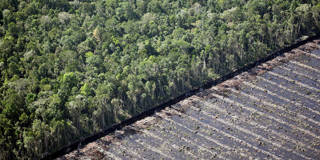How Can the New EU Regulation Achieve Deforestation-Free Supply Chains?
The European Union’s recent legislation to reduce commodity-driven deforestation is an important step toward preventing further biodiversity loss and combating climate change. But its effectiveness depends on capturing granular data on smallholder farmers operating in informal supply chains.

MONTREAL – Deforestation, which accounts for roughly 25% of global greenhouse-gas emissions, is primarily driven by commodity production for global markets. Legislation recently enacted by the European Union aims to curb deforestation by banning the import of commodities and products linked to it. The measure represents an important step forward, but gaps in critical data are set to undermine its effectiveness.